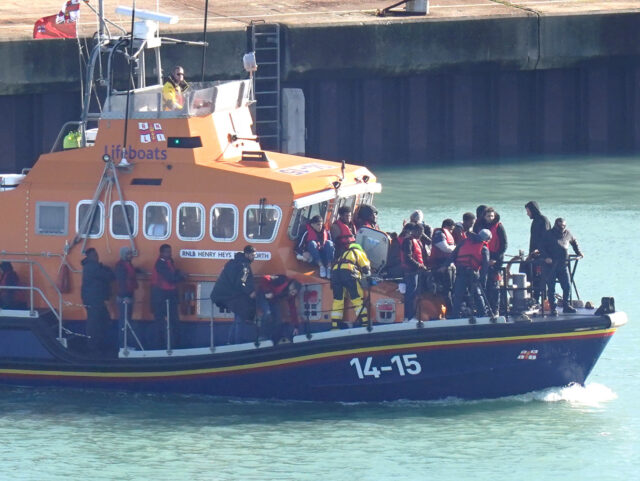The boat migrant crisis in the English Channel has escalated to the point that up to two per cent of “the entire adult male population of Albania” have now landed in Britain, according to the top border official for crossings.
Dan O’Mahoney, whose post as Clandestine Channel Threat Commander was created in 2020 by then-Home Secretary Priti Patel as one of many initiatives intended to make it appear as though the Conservative government was actually doing something about the ever-worsening situation, made the comments to the Home Affairs Committee of the House of Commons.
Giving evidence which is available to be viewed in full on the official parliamentlive.tv website, O’Mahoney told MPs on the committee that he thought it was “important to paint a picture of the type of illegal migration that we’re talking about this year and just how quickly the scale has accelerated”, confirming that over a three-year period the number of Albanians among the boat migrants influx had gone from 50, to 800, to 12,000 in 2022 so far — “of which about 10,000 are single adult men”.
“Just to put this into context, that number of 10,000 is between, depending on how you classify it, between one and two per cent of the entire adult male population of Albania [who have] travelled to the UK in small boats,” he said.
He later clarified that he was referring to the segment of the Albanian population aged 20-40, according to The Times.
Albanian Drug Gangsters Claiming to be Slaves to Skirt Jail Time: Report https://t.co/YxW9LUWNak
— Breitbart London (@BreitbartLondon) April 8, 2021
The border tsar credited this “exponential” increase to Albanian organised criminals with a “foothold” in northern France facilitating the movement of Albanian migrants, conceding that a “large number” of them are “deliberately gaming the system” and not legitimate refugees or victims of modern slavery or trafficking, as they claim.
While at pains to say he was aware of a “very strong, vibrant Albanian community in the UK that make a great contribution to our country,” the official went on to admit that “the flip side” of this is “a huge amount of very harmful serious and organised criminality in the UK committed by Albanian criminal gangs.”
“Whatever sort of criminality you can think of of the most serious sort, there are Albanian criminal gangs who are dominating in those markets… drug smuggling, human trafficking, guns, prostitution,” he said, with unusual frankness.
Indeed, Albanians became the largest foreign population in British prisons in 2020, despite the Muslim-majority Balkan country having a total population of not even three million, compared to well over a billion for India and well over 200 million for Pakistan, to cite two examples of countries with large and long-established diasporas in the United Kingdom.
Albanian Criminals Now Largest Group of Foreigners in British Prisons https://t.co/itJqkux4iq
— Breitbart London (@BreitbartLondon) May 3, 2020
Elsewhere in the session, O’Mahoney claimed that, despite the enormous rise in boat migrant arrivals, he actually regarded operations as “very successful” because there had been no loss of life at sea in British territorial waters in two years and a drop in so-called “uncontrolled” landings — that is, landings where migrant boats were not met offshore and either guided safely to British shores, or their passengers brought aboard British vessels and landed on them.
Asked if the British public might not reasonably expect that preventing migrant crossings should be the main metric for success, O’Mahoney revealed that “the role of the Royal Navy and our operations in the Channel has never been to prevent crossings” — which may come as a shock to members of the public who were told by the Home Office that he was going to “[lead] the UK’s response to tackling illegal attempts to reach the UK” when his job was created.
Channel Migrant Tsar Claims ‘Vast Majority’ of Asylum Seekers Are ‘Genuine’ https://t.co/bqLvZ8b34C
— Breitbart London (@BreitbartLondon) October 12, 2020
In terms of the British government’s overall effectiveness in dealing with the Channel migrant crisis, Home Office officials appearing before the Home Affairs Committee alongside O’Mahoney could not offer much encouragement.
The chairwoman of the committee, asking how many migrants claiming asylum in Britain after arriving by boat had had their applications accepted in previous years, was told that the figure for 2021 was an astonishing 85 per cent — despite the fact they had arrived via safe European Union member-states, in the form of France and Belgium, where they were in no danger of state persecution.
Pressed on this remarkable figure by another MP on the committee, the official further revealed that 96 per cent of asylum applications lodged by boat migrants had not been completed — so the 85 per cent acceptance figure referred to a mere four per cent of 2021 applicants.
In terms of Albanian asylum claimants specifically, it was reported earlier in October 2022 that Britain appears to be a soft touch, accepting 52 per cent of claims while France accepted just eight per cent of claims and Germany and Sweden — not exactly known for tough border policies — accepted zero.
‘Dumping Ground of the World’ – UK Accepting Migrant Asylum Claims at Far Higher Rates than EU Nations https://t.co/pMwDRbUuwa
— Breitbart London (@BreitbartLondon) October 17, 2022

COMMENTS
Please let us know if you're having issues with commenting.